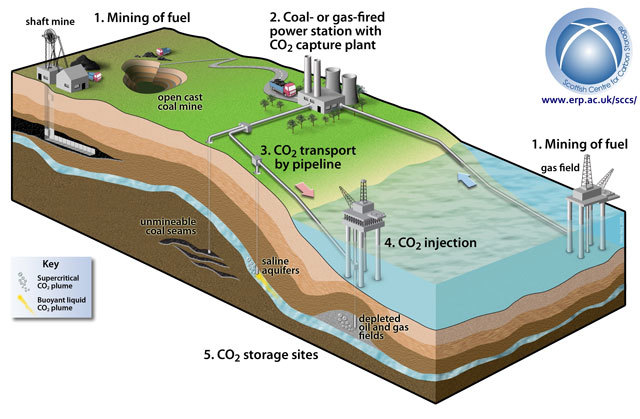
Decisions on funding two pilot schemes to capture and bury carbon emissions from power stations need to be fast-tracked after a decade of delay, MPs have urged.
Carbon capture and storage (CCS) technology, which captures emissions from fossil fuel power plants and permanently stores it underground, could help keep greenhouse gases within the limits needed to stop dangerous climate change, a parliamentary committee said.
But the technology needs financial support to get it going in the face of high costs, and there are currently just a handful of projects worldwide with none fitted to full scale power stations, the Energy and Climate Change (ECC) committee warned.
In the UK, years of delay in a “competition” launched in 2007 to provide financial support for pilot schemes has seen the estimated date for getting projects up and running slip from 2014 to 2020.
A report from the committee has urged the Government to make final funding decisions on two pilot projects at Peterhead, in Aberdeenshire, and Drax, in North Yorkshire, by early 2015.
And it called on ministers to prioritise coming up with a framework of subsidies for carbon capture and storage projects with guaranteed prices for energy similar to those being brought in for new nuclear reactors and renewables such as offshore wind.
Deploying the technology early in the UK could have significant economic benefits, including opening a “storage market” in which other countries pay to permanently store carbon dioxide in the UK’s disused offshore oil and gas fields in the North Sea, it said.
Other energy projects, including coal plants, wind farms and fracking for shale, have attracted public opposition, the report warned, and called for a public engagement strategy to dispel myths about the technology and respond to concerns over safety.
Energy and Climate Change Committee chairman Tim Yeo said: “Fitting power stations with technology to capture and store carbon is absolutely vital if we are to avoid dangerously destabilising the climate.
“After nearly a decade of delay the Department of Energy and Climate Change (Decc) has finally got near to delivering two pilot carbon capture and storage projects in the UK.
“It must now fast-track these projects and reach final investment decisions before the election to ensure this technology can start delivering carbon savings by the 2020s.”
But he added: “These two demonstration projects will not be enough to kick-start the industry or have a significant impact on our carbon budgets, however.
“Ministers must also ensure that viable CCS projects not involved in the competition are able to apply for guaranteed-price contracts alongside other low-carbon energy schemes.”
The latest assessment from the UN’s Intergovernmental Panel on Climate Change (IPCC) estimated that to keep global temperatures from rising by no more than 2C, the maximum amount of carbon emissions that can be released is 1,000 gigatonnes.
With over half that amount (515 gigatonnes) already put into the atmosphere worldwide, a substantial proportion of the world’s proven fossil fuel reserves – which contain 780 gigatonnes of carbon emissions – cannot be burnt without CCS technology, the report said.
Nick Molho, head of climate and energy policy at WWF-UK, said: “After years of unnecessary delay, getting on with the task of demonstrating the technical and commercial feasibility of CCS is an urgent priority for this Government and the next.
“But the Government shouldn’t plan significant investments in new fossil fuel plants today on the assumption that CCS technology will be available at an affordable cost in the future to capture emissions when we simply don’t know that yet.”
Recommended for you
